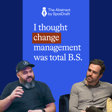
Ep 103: Building What Doesn’t Exist Yet: Inside the Legal Career of Tommie Tavares-Ferreira
In this special episode of The Abstract, host Tyler Finn speaks with Tommie Tavares-Ferreira, newly appointed Chief Strategy Officer at Lawtrades and longtime legal ops leader, community builder, and podcast host.
Tommie walks us through her unconventional path from the music industry to Peloton, Rakuten, Cedar, and now the executive team at Lawtrades. She shares lessons on scaling companies, embracing curiosity, balancing parenting with leadership, and how legal ops leaders can (and should) step into strategy roles. It’s a personal, powerful conversation about evolving careers, future tech, and the next phase of legal work.
Read detailed summary: https://www.spotdraft.com/podcast/episode-103
Topics:
Introduction: 0:00
Tommie’s early career in music, HBO, and the spirit of DIY creativity: 2:26
Legal ops as a career by necessity, not design: 5:03
Legal ops as a creative discipline and never-ending work: 6:53
Helping businesses scale through legal ops alignment and prioritization: 8:39
Love of technology, fears of automation, and the case for balance: 13:46
Bringing legal teams into the AI journey and overcoming resistance: 19:24
Why Tommie joined Lawtrades and what she hopes to build: 24:55
Legal ops as strategy and expanding the role into go-to-market leadership: 33:15
The glass ceiling in legal ops and the need for executive pathing: 36:52
Rapid-fire questions: 41:17
Connect with us:
Tommie Tavares-Ferreira - https://www.linkedin.com/in/tommie/
Tyler Finn - https://www.linkedin.com/in/tylerhfinn
SpotDraft - https://www.linkedin.com/company/spotdraft
SpotDraft is a leading contract lifecycle management platform that solves your end-to-end contract management issues.
Visit https://www.spotdraft.com to learn more.



















